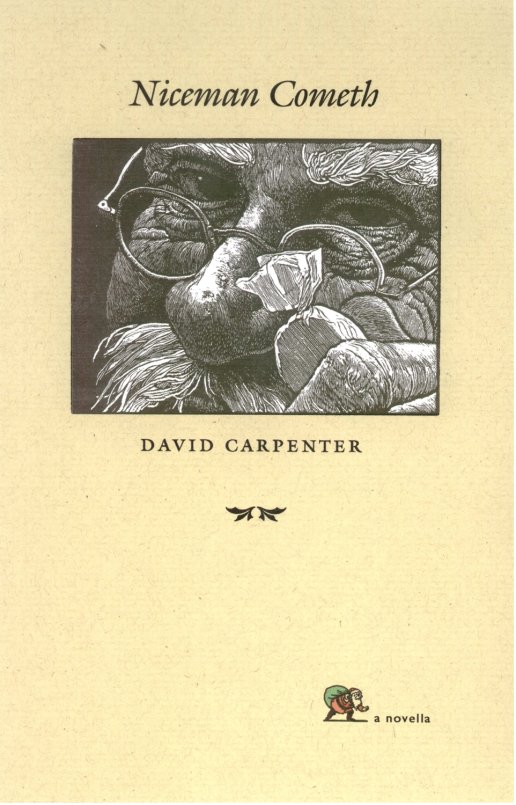Niceman Cometh

A love quadangle
Three men conceive an immoderate heat for Glory, a single parent and waitress at Pie City. She, on the other hand, has pretty much had it with men.
Glory and her young son Bobby are just trying to get through the winter in Saskatoon. Can love flourish in such an inhospitable environment?
Just watch.
 Saskatoon Book Award 2009
Saskatoon Book Award 2009
Saskatchewan Book Awards
Reading Excerpt
David reads from Niceman Cometh
Critical Response
"Veteran Saskatchewan writer David Carpenter is back, this time with Niceman Cometh, a novel about a freshly single mom named Glory making a go of it with her six-year-old, Bobby, as well as dealing with an unforgettably discombobulated cast of characters.
Terrifically plotted and perfectly paced, this multi-narrated romp dwells lovingly upon one precious, precocious and irresistibly typical preteen's reaction to the string of men who snake through his young life (thanks to his mother's many admirers). As well, its inventive and infinitely compassionate creator also nails a gonzo portrait gallery of characters ranging from the randy radio personality Rickey Bullerd to Glory's co-worker Jolene, mother of her son's playmate, Fern.
A friend of Glory's, Jolene calls 'em as she sees 'em: "Glory had a good eye for a sonofabitch." And Carpenter has a good ear for convincing dialogue,charming vignettes and fully realized situations.
The Niceman of the title cometh around Christmas in this year-in-the-life saga, but each chapter of the work is a lovely, beckoning present in its own light and a tragicomic gift in its own right. Dread and desire never had it so good, most likely because its handler possesses storytelling skills most writers rightfully covet, almost as much as the oddball collection of suitors covets Glory in Carpenter's follow-up to the award-winning Banjo Lessons."
-Judith Fitzgerald, The Globe&Mail
"David Carpenter is my favourite Saskatchewan writer. The Steinbeck of the Stubble Jumpers is wry, darkly comic, lyrical, realistic and clever. Most important, he has artistic integrity.
His latest work of fiction, Niceman Cometh, is set in his humble hometown of Saskatoon, which is a risky choice in a marketplace crowded with New York City-based Sex in the City derivations and Da Vinci Code globetrotters.
Glory Sacher is a single mother and a career waitress who works at Pie City. Glory drives a rusty Honda on loan from her on-again, off-again DJ boyfriend, Ricky. When he's not trying to woo Glory back via the airwaves of his late-night radio show, Ricky trolls the local walking trails for bimbos. Ricky is a self-loathing predator who wonders "what it was that girls and women saw in bad men that led them to destruction."
The selfishly relentless yet emotionally ambivalent Ricky is one reason Glory's sensitive son, Bobby, wets the bed. The other source of Bobby's angst is the creepy downstairs neighbour, Jerry. As the book begins, Jerry's mother and Glory's landlady, Peg, has just died. Her messy house is the perfect setting for Glory's romantic dilemma: "Each pile of rubble, each abandoned project, was a monument to failed love."
Jerry has been evicted from the family home yet continues to squat there and stalk Glory. The violent and alcoholic Jerry stores poisonous rattlesnakes in his garage. A creature of the night, Jerry works the graveyard shift as a janitor at the university's reptile laboratory.
The men in Glory's life aren't all opportunistic creeps. Her unlikely new love interest, James, is an impoverished freelance writer who pens fortune cookie copy for a living and writes an events column for the local indie weekly, The Moon. He's down and out but really tired of accepting handouts from his snowbird father, so he takes a seasonal job as Santa Claus.
The role snaps him out of his depression, makes him a bit of a local celebrity, and James starts to sport his jaunty red uniform wherever he goes. James is the perfect chubby anti-hero to the more attractive but cold-hearted Ricky. Once James enters the picture, the narrative takes on a less sombre and more hopeful tone. Perhaps Glory finally has one viable love candidate.
I won't spoil the plot for you, but the ending of this brief novel came too quickly for my liking."
-Patricia Robertson, Toronto Star
"Only a writer with the confidence of an English professor would dare give away his novel's punch line by the wordplay of its title. But, hold on; that's not the whole story. There are enough twists and turns and cliff-hangers to keep us fully engaged the whole way.
Glory Sacher is not in love with anyone, except her six-year-old son Bobby.
She's living on the top floor of a rundown house west of downtown Saskatoon, working as a waitress in a pie shop, and trying to get her latest boyfriend -- a drunken and emotionally abusive radio disc jockey -- out of her life.
Ricky Bullerd is the DJ. He's somewhere well north of 30, but has never grown up. He and his dog have hung around Glory long enough to confuse both her and her son with sleepovers and fights, punctuated by extended absences.
The story begins to develop when Peg Walter dies. Glory's landlady shuffles off, leaving a sad and cluttered life -- and a no-good son, Jerry, who she cuts out of any meaningful inheritance, save for a few thousand dollars and the knowledge that he must vacate the soon-to-be-sold house.
Jerry Walter is a frightening presence in the basement of the house, where Glory and Bobby are the only tenants -- a young man in whom she sees "a great blankness, a place inside large and empty, like an abandoned building."
The cast is rounded out by the Niceman, James Wellington Waller. A frustrated actor and failed intellectual, Waller exists on short-lived jobs and stipends from an absent father. He was married once, but his wife left because she couldn't wait for him to find himself. Since then, he has packed on the pounds to a point where he weighs slightly less than 300 pounds -- and feels every one of them.
Not a tremendously attractive character, to be sure, but life is about to change for James Waller. As a last resort, he hits up an old friend of his father's for a job, and the mall manager gives him the only position that Waller might not screw up -- Santa Claus.
Let's leave the story there, except to note that Santas naturally meet little boys and mothers.
But lest the reader be lulled into a traditional boy-meets-girl love story, one must not forget Carpenter's nod to Eugene O'Neill's classic tragedy. The Iceman Cometh was populated by a cast of self-delusional down-and-outers who suffered love-hate relationships with women. We know that the drunken DJ, Bullerd, and psychotic landlady's son, Walker, are lurking and ready to throw a wrench into Glory's happiness.
Carpenter is a joy to read. Whether writing from the perspective of young Bobby or Bullerd's dog (yes, the dog), the author imparts a remarkable sense of place, painting pictures that allow the reader to walk with his characters along the streets of Saskatoon, imagining and exploring actual locales.
Carpenter . . . wanting to engage his readers quickly, arms himself with a dazzling sense of linguistic detail and a deft control of his sketching pen."
-Ted Hainworth, The StarPhoenix
